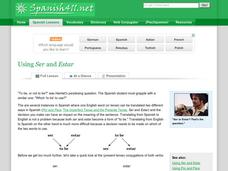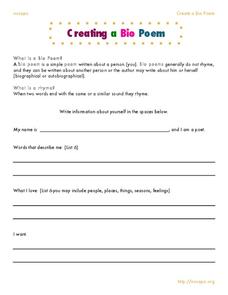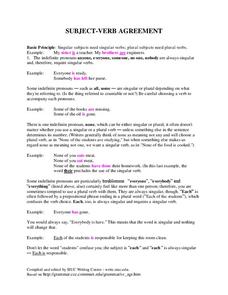Aurora City School District
Do Not Try to Kid a Kidder: The Art of Persuasion
The power to convince others of your argument lies in your knowledge of rhetoric! A thorough packet covers the basics of persuasion, including logical appeals and fallacies, and applies strategies to letters to the editor,...
Waterford Union High School
Writing the Persuasive Essay
An excellent, in-depth resource would be an asset to your unit on writing an argument essay. It provides an explanation to each part of the essay as well as examples of transition words to strengthen your kids' writing. Additionally, the...
Curated OER
Spanish Punctuation & Capitalization
Grammar rules in all languages, but that doesn't mean it's the same from English to Spanish. This informational webpage describes the similarities and differences between English and Spanish for the following: periods, commas, question...
Curated OER
Using Ser and Estar
While ser and estar both mean to be, they are each used in different situations. This is often confusing for Spanish language learners. Clarify these verbs for your class with direct instruction. The information included on this page...
Curated OER
Past Participles
Consider this online resource that includes accurate information about past participles for a reference material for your Spanish language, or as a source of inspiration for your own lesson. Beginning with a definition of past...
Saylor Academy
Persuasive Techniques
Want to safeguard your students against peer pressure? Teach them all about rhetorical appeals, common attack methods, and various argument tones with a reference sheet on persuasive techniques.
Urban Education Exchange
Lessons and Units: The Watsons go to Birmingham—1963 5TH GRADE UNIT
Get ready to read The Watsons Go to Birmingham - 1963 with a lesson about historical fiction. Spanning several centuries, the resource prompts learners to guess the historical era of a story based on a word or phrase in the text. In...
MENSA Education & Research Foundation
The Writer’s Toolbox: What You Need to Master the Craft
Strengthen your high schoolers' writing with a series of steps for writing successfully. With sections on organizing an essay, choosing a topic, crafting a thesis statement, and revising a draft, the lesson encourages your class to...
Houghton Mifflin Harcourt
Around Town: Neighborhood and Community: Challenge Activities (Theme 3)
Here is a unit consisting of activities designed to challenge your scholars. The extended learning opportunities include planning a celebration, making a presentation to the class, poster making, writing poetry, a problem-solving...
Geography 360°
Poetry Writing
Put the tips and tricks in this guide into practice in order to encourage your pupils to blossom into poets. A wonderful reference material for teachers, this packet includes definitions of poetic terms and forms as well as step-by-step...
Amazon Web Services
Idiom Dictionary
Examining idioms is a peace of cake when using this graphic organizer! Here, grammarians identify an idiom and use it in a sentence. Then they investigate its literal meaning versus its figurative meaning, and accompany each one with a...
Prestwick House
Rhetorical Devices in Political Speeches
Have you ever watched a political speech and felt your heart beat a little faster, and your opinion either solidify or begin to slightly change? Rhetorical devices can be a strong tool in an effective and powerful speech. A short lesson...
Curated OER
The Language of Love
In this language arts worksheet, students learn that there are many ways to express love using words. Students read 20 sentences which show different ways of expressing affection. Example: "You are in my heart." There are no questions...
Jolly Learning Ltd
Jolly Grammar Action Chart
An excellent grammar reference page from Jolly Phonics provides definitions and actions to remember several fundamental parts of speech. The methods are interesting for learners who have a hard time remembering the differences between...
Nosapo
Reading Activity: Circle the Right
Fables can teach us about life's morals, but they are also helpful for reviewing verb tense, spelling, and word choice. Three reading passages feature well-known fables, each with several opportunities for learners to circle the correct...
Curated OER
The Goldilocks Rules for Choosing a Book That Is “Just Right”
With so many books to choose from, it can be hard for young readers to find the right one. Help children overcome this problem with this list of rules for identifying books that are too easy, too hard, and those that are just right.
Curated OER
Identify the Parts of a Newspaper features of informational text, newspaper format
Young readers make sense out of the wealth of information in newspapers with this helpful reference document. Pointing out basic features like headings, articles, bylines, and captions this resource is a great tool for introducing...
Curated OER
Summarizing with Somebody Wanted But So
Teach your young readers how to summarize a text using a strategy called Somebody Wanted But So. Kids identify the character (Somebody), the motivation (Wanted), the conflict (But), and the resolution (So). The resource comes with...
K12 Reader
Narrator’s Point of View Flow Chart
How can you tell what point of view a narrator is using, and why does it matter when reading or writing? Use a handy flow chart to determine whether or not your narrator is telling the story from a first or third person point of view.
Book Units Teacher
Skill Lessons – Prefixes and Suffixes
Sometimes the best way to understand a concept is to break it down. Young vocabulary pupils work with word parts in a hands-on activity that prompts them to connect flash cards with affixes to their root and base words. Additionally,...
Nosapo
Pronouns: Personal Pronouns, Demonstrative Pronouns
Which do you use: that or this? Which or where? Me or I? Practice pronoun use with a series of activities that focus on personal and demonstrative pronouns.
Nosapo
Creating a Bio Poem
Find out what's special about your pupils with a fun biopoem activity! As they fill out their name, words that describe them, what they love, and what they dream of, learners create an expressive poem about themselves.
Nosapo
Family Titles, Pronouns, Writing about a Person
How is your grandmother related to you? How is your cousin related to your grandmother? Learn about family relationships and pronouns with an activity that guides pupils to write two short narratives about members of their families.
Southern Illinois University
Subject-Verb Agreement
Your writing lessons may be all about solid arguments, but in grammar, it's all about agreement! Learners practice identifying proper and improper verb form in a worksheet focused on subject-verb agreement and indefinite pronouns.
Other popular searches
- Foreign Languages
- Foreign Languages Spanish
- World Languages
- Foreign Languages French
- Foreign Languages Italian
- Cultural Languages
- Foreign Languages German
- Foods Foreign Languages
- Languages" | "Foreign Language
- Languages Foreign Language
- Foreign Languages Directions
- Foreign Languages Animals

























